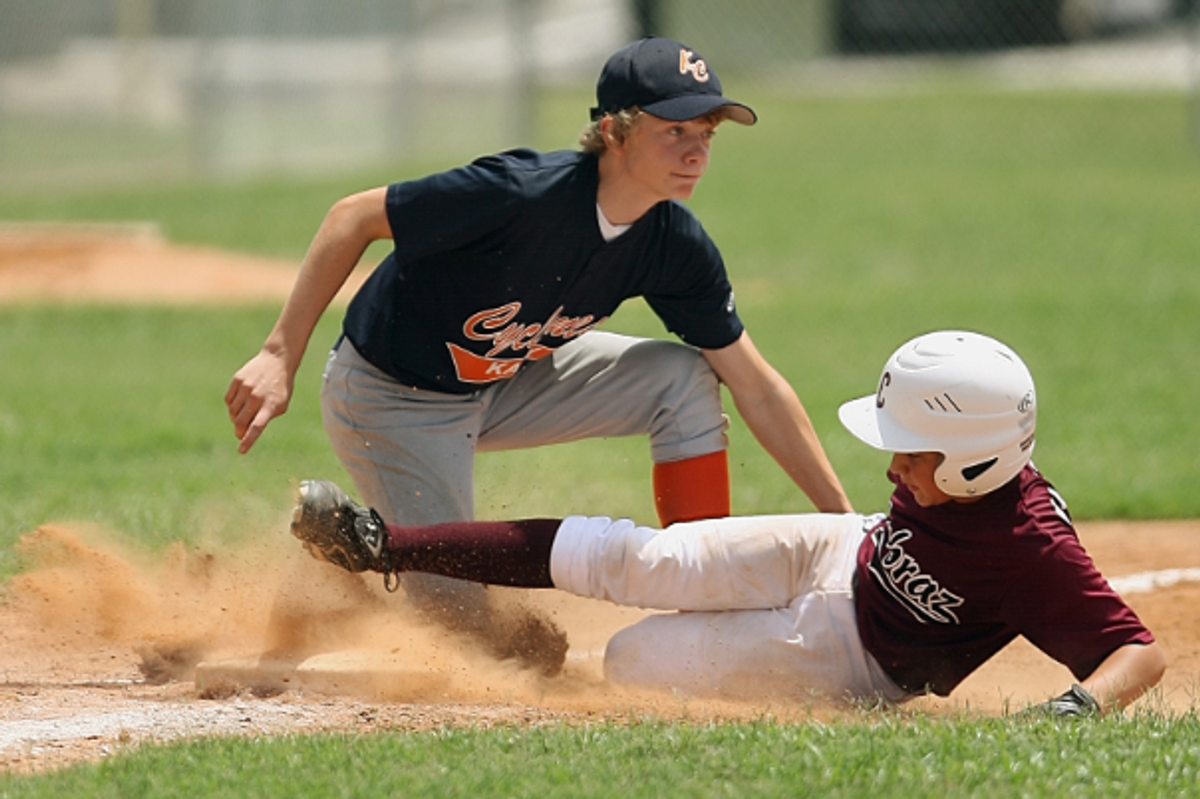Mom shares hard truths for travel ball parents who think their kids will get a sports scholarship
"Parents aren't the problem, they're the product."
High schoolers playing baseball.
In December 2025, Katherine Van Dyck, a senior legal fellow at the American Economic Liberties Project, testified before the U.S. House Committee on Education and the Workforce's Subcommittee on Early Childhood, Elementary, and Secondary Education about the growing takeover of youth sports by private equity firms. This new profit-driven system is replacing once-affordable community sports organizations with pricey programs that exclude many families.
At the center of this new youth sports paradigm is the bargain these leagues offer parents: If you pay thousands upon thousands of dollars, your child will have the opportunity to earn a college scholarship and possibly make it to the pros. During her testimony, Van Dyck noted that many parents have bought into the promise.
Parents overestimate the chances their children will receive athletic scholarships
Van Dyck shared a poll showing that 49% of parents whose children participate in youth sports (ages 7-18) are "confident" their child will receive an athletic scholarship. Unfortunately, only about 7% of high school athletes go on to play college sports, and just 2% receive an athletic scholarship.
"Families are going into debt, and it's based on a lie," she said in her testimony. "Forty-nine percent of parents believe their children will get an athletic scholarship. In fact, only two percent of college applicants actually do."
@bobbyleebaseball What was once recreational neighborhood fun has become mandatory travel sports. Families are being convinced that it is the only way for children to be competitive in the sport, and that if they aren’t giving in to the pressure then they are failing their children. It is not true. Families are spending thousands a year, and hurting their children’s health and development along the way, because they don’t realize they are being manipulated into spending. It’s a marketing scheme meant to keep registration numbers and tournament participation high, to extract as much as they can from families. And parents have been convinced that if they aren’t doing it, then their children’s are missing out. Everyone is sounding the alarm, and it has now made its way to the U.S. House Committee on Education and the Workforce Subcommittee on Early Childhood Education. #congress #baseball #youthsports #youthbaseball #children
If 49% seems like an anomaly, a 2024 study found similarly inflated expectations: 34% of parents with children ages 6 to 17 believe their kids will play college sports, and 27% think they are likely to receive a college scholarship.
Youth leagues often dangle the scholarship carrot in front of parents who face either heavy debt or foregoing college altogether. They also appear to brandish the stick, suggesting that parents who don't pay up aren't doing everything possible to help their kids succeed.

"The industry has learned that the easiest way to get parents to ignore their instincts is to convince them that their instincts are selfish," said Dr. Jennifer Fraser, who studies youth sports psychology, according to Beyond the Drill. "Parents will endure almost anything if they believe it's what their child needs to succeed."
Melissa Panzer, a TikToker who focuses on the challenges of being a working mom, recently went viral with a video responding to Van Dyck's testimony and unpacking why so many parents are hedging their bets on a college scholarship. She also outlined a new way forward for parents who don't buy the story the youth leagues are selling.
@seriouslymakeitmakesense This clip isn’t about sports. It’s about how families are being squeezed. For context: • There are roughly 8 million high school athletes in the U.S. each year • About 160,000 will receive any athletic scholarship money • Most scholarships are partial, not full rides • Meanwhile, youth sports has grown into a $30+ billion industry — almost entirely funded by families That mismatch isn’t an accident. It’s the business model. In the meantime, while the system remains broken, here are a few things that can help soften the blow: • Ask what your child actually enjoys — not what feels strategic • Set a clear family budget before the season starts • Remember that most college pathways do not run through elite youth sports • Know that opting out is not “falling behind” Parents aren’t the problem. They’re the product. 📌 Testimony from a hearing before the House Committee on Education and the Workforce Credit to Katie Van Dyck Thanks to @seasters jones. for sharing the cllip
Why parents are betting on their kids getting athletic scholarships
According to Panzer:
"So, parents start looking for any way to reduce that [college] bill later. And sports have become one of the few paths that still look merit-based. Most parents don't actually believe that their kid is the exception, but when college feels impossible to pay for, hope still creeps in. Because the alternative is debt, and that follows your kid around for decades, and that sucks. And that's why families keep paying, not because they're foolish, but because the system is designed to monetize fear and aspiration at the same time. And that's what's infuriating."
Panzer argued that if parents truly want their children to earn scholarships, they should focus on academics. "Way more students receive academic scholarships than athletic scholarships," Panzer said. "Athletic scholarships get all the hype, but they are one of the rarest forms of aid."
She closed her video by laying out several things parents should consider before spending thousands of dollars on elite youth sports teams and travel clubs:
"Ask what your child really enjoys—not what feels strategic."
"Set a clear family budget before the season starts."
"Remember that most college pathways do not lead through elite youth sports."
"Know that opting out is not 'falling behind.'"
"Parents aren't the problem, they're the product."

